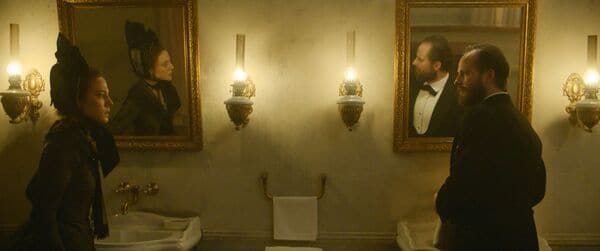Eye For Film >> Movies >> Tchaikovsky's Wife (2022) Film Review
Tchaikovsky's Wife
Reviewed by: Jennie Kermode

One of the phenomena to emerge from the last few years of increasing female representation in cinema has been an exploration of the roles played by women married to great men, often uncovering significant contributions to that greatness, or at least equally interesting personalities. Whilst this might seem to be another contribution to that process, it’s doing something slightly different. Antonina Miliukova is not the sort of subject to whom cinema normally pays much heed. What records remain of her life – including what were most probably her memoirs – suggest, instead, a damaged and vulnerable person with a fragile grip on reality.
Kirill Serebrennikov’s drama sticks closely to this interpretation. “I’m not some mad person,” she begins, having invited the composer, her sometimes music instructor, to her lonely room. In the same conversation, however, she switches from discussing her dowry to saying that she may kill herself without even drawing a breath. Star Alyona Mikhailova finds a sweetness and a kind of consistency within her even though it is clear that she is operating in accordance with a very different set of perceptions from anyone else. This carries the film beyond the point where one might consider it exploitative. It does not mock its subject, nor invite viewers to gawk at her. Rather, it invites sympathy for someone who finds herself confounded and confused by circumstance yet is, in her own way, heroic, trying to stick to her principles and express her love in spite of everything.
There is sympathy, too, for Tchaikovsky (played by Odin Lund Biron), who marries her on impulse in an effort to conceal his homosexuality, and regrets it for the rest of his days. His sexuality has historically been subject to so much shame in Russia that it has been pointedly ignored, but here his sister addresses it directly, along with her belief that it is not a matter of choice – a daring position to take at a point when Russian authorities are quick to condemn any positive representation of LGBTQ+ people and have denounced those supporting LGBTQ+ right as ‘extremists’. The composer’s own feelings on the matter have never been wholly clear and there is no effort to explore them here – it’s just another of the ways in which he remains a closed book to Antonina.
What unfolds is an emotionally complex drama driven by his guilt and his inability to cope with living with someone as urgent and impassioned as Antonina, who offers none of the peaceful, companionable love he had imagined her might find with a woman. She, however, seems damaged in part as a result of family problems which we are privy to on brief visits as comic as they are grim. “A real woman can have her way with any man!” shouts her mother angrily, shortly after admitting that she too unwittingly married a gay man. Antonina’s sister is also bullied. It’s easy to see why Antonina might have fled, why she might have sought desperately for love elsewhere, even if she could only find it in her imagination.
The impossibility of supporting somebody as damaged as her – at least if one is also emotionally fragile oneself, and dependent, as Tchaikovsky was, upon doing creative work – is, for him, balanced by the awareness that he has allowed this situation to develop, the belief that he ought to have been more considerate to begin with. A brief encounter with the composer Nikolai Rubinstein suggests, though, that Antonina was always going to seek out a relationship of this type, as she's dazzled by fame that she fails to take in anything that has been said.
Serebrennikov frames Antonina’s troubles by way of a prefix which laments women’s legal dependency upon men at that time, and the difficulties presented by strict divorce laws which took little account of lived realities. Again, it contributes a political subtext, in light of the fact that there have been serious moves by right wingers in the country to restore that state of affairs. When other sexual opportunities present themselves to Antonina, we see her briefly forget the tragedy by which she has defined herself and flare into life, but it is a side of herself which, at other times, she seems unable to acknowledge, let alone reconcile with.
The film is exquisitely composed. Cinematographer Vladislav Opelyants can see a world of detail in a plain white wall, and gives the visual environment a depth which resonates with Antonina’s tendency to see what isn’t there. Serebrennikov’s compositions remind us of the talent and opulence surrounding the unhappy couple yet often out of reach. In one scene, the two argue against a backdrop of three standing harps. Strands of gold and yellow weave their way through the film as they did through Soviet Russia, divorced from their original meaning. The couple never see much money and we never see the sun shine. There is just that possibility of happiness, adjacent. For much of the latter part of the film, Antonina wears a tight veil of fine black mesh, like a shield against the world.
The music is an easy choice, but Serebrennikov has found its counterpart in image and in theme. This is not the sugary stuff of his most popular works. It is haunting, melancholy, a testament to dreams which died all too easily.
Reviewed on: 29 Dec 2023


















